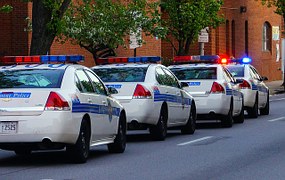 Last week a former Baltimore police detective was sentenced to 18 months in prison followed by 2 years of supervised release for making false statements to a federal grand jury. The statements were regarding an incident that happened in the spring of 2014, when another BPD officer ran over an arrestee in Baltimore City. That officer, who was not named in the U.S. Attorney’s press release, apparently called the former detective’s sergeant to inform him of the car accident involving a suspect. The sergeant then asked the former detective if he had a BB gun that they could use to plant at the scene, in an ill-conceived effort to provide justification for suspect being hit with a vehicle. The former detective told his sergeant that he did not own a BB gun, but then called his partner, who did own a BB gun. The sergeant and former detective then drove to the partner’s home to retrieve the BB gun and then went back to the scene of the auto accident, where the sergeant planted the gun. The former detective apparently stayed by the car and did not assist in planting the BB gun at the scene.
Last week a former Baltimore police detective was sentenced to 18 months in prison followed by 2 years of supervised release for making false statements to a federal grand jury. The statements were regarding an incident that happened in the spring of 2014, when another BPD officer ran over an arrestee in Baltimore City. That officer, who was not named in the U.S. Attorney’s press release, apparently called the former detective’s sergeant to inform him of the car accident involving a suspect. The sergeant then asked the former detective if he had a BB gun that they could use to plant at the scene, in an ill-conceived effort to provide justification for suspect being hit with a vehicle. The former detective told his sergeant that he did not own a BB gun, but then called his partner, who did own a BB gun. The sergeant and former detective then drove to the partner’s home to retrieve the BB gun and then went back to the scene of the auto accident, where the sergeant planted the gun. The former detective apparently stayed by the car and did not assist in planting the BB gun at the scene.
The suspect who was run over by the officer’s car was arrested that night and charged with numerous drug crimes in addition to discharging a BB gun, which we now know was completely fabricated. The suspect was held in custody for several days, and prosecutors eventually dismissed all charges about 10 months later. The officer who ran the suspect over was indicted with several other Baltimore Police officers who were members of the notorious Gun Trace Task Force or GTTF. The incident regarding the planted BB gun came up in one of the federal GTTF investigations, and the former detective was subpoenaed to provide his testimony on what happened. The former detective told the grand jury that his sergeant requested that he call his partner to inquire about the BB gun, but the partner said he did not have one. The detective then insinuated that while at the scene of the accident the sergeant went to the trunk of his vehicle to retrieve an unknown object.
Many of the former GTTF officers provided substantial assistance to the government in consideration for lighter sentences, and information on what actually transpired the night of the accident appears to have come from one of those proffer sessions. Federal law enforcement learned that the detective and his sergeant arranged a secret meeting by communicating on their wives’ cell phones. They actually met in a swimming pool to assure that neither was wearing a wire, a scene right out of the movie Traffic. At the secret meeting both officers discussed their concerns over the GTTF indictments, and then the sergeant apparently told the former detective to lie about why they went back to the scene of the accident. The sergeant told the detective to tell federal authorities that the sergeant retrieved the BB gun himself and that the former detective had played no part in obtaining it. Unfortunately for the detective, federal authorities were able to prove that these statements were made with the intent to deceive the grand jury, and a stiff sentence followed from this poor decision.
 Criminal Defense Lawyer Blog
Criminal Defense Lawyer Blog



